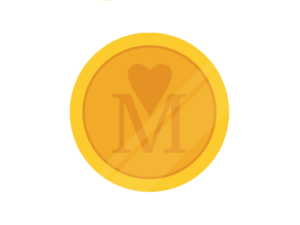Are you looking to buy cryptocurrency online? You’ve certainly come to the right place! Here at Coinmama, you can buy crypto such as Bitcoin, Ethereum, Ripple, Litecoin, and more using your credit card, debit card, or bank account – but first, let’s take a breath…
Your first plunge into cryptocurrency can be exhilarating—particularly when prices are soaring! However, it’s always best to start out in a calm and collected manner. Taking the time to understand things before making any big moves will ensure that you avoid costly mistakes and unnecessary confusion.
At Coinmama, we’ve helped over 1.5 million customers to buy cryptocurrency online, so we have a lot of experience with helping newcomers into the crypto market. This guide covers some of the most essential and practical aspects of cryptocurrency, and will help you to establish yourself in the world of crypto as smoothly as possible.
First, you need a wallet
To buy cryptocurrency online from Coinmama, you first need to get yourself a wallet. This applies to all the different types of crypto we support. Some exchanges allow you to deposit regular money (often referred to as “fiat” in the crypto space) into your account and trade it for cryptocurrency, which you may then store in your exchange wallet.
However, as the long and tragic list of exchange hacks and failures will attest, leaving crypto in the care of an exchange is risky. In fact, it’s the practice which newcomers are most frequently warned against by experts (“Your keys? Your coins! Not your keys? Not your coins!”).
Coinmama is a brokerage rather than an exchange, meaning that we don’t hold any crypto on behalf of our users. This is why you’ll need to first get a third-party wallet for storing your own coins before you can buy Bitcoins or any other altcoins from us. A third-party wallet is the most secure way to store your coins as it gives you the most control over your funds. (And the extra good news? Most wallets are free!)
So, what is a wallet?
Cryptocurrency wallets are software apps or hardware devices, whose primary purpose is to securely store and transmit your crypto funds. The term “wallet” works in casual usage, as cryptocurrency wallets are used when you want to spend or hold funds, just like your pocket wallet and banknotes or coins. On a technical level, however, cryptocurrency wallets have more in common with keyrings…
We promise not to get too technical here, but understanding the way in which cryptocurrency wallets work is really important for using them securely. The most essential part of your wallet is your cryptographic private keys. These “privkeys” control the ability to send cryptocurrency from your specific crypto address. The main function of a wallet is to securely generate and store these private keys.
You can think of a privkey as a randomly-generated password. It’s necessary to send coins from a particular cryptocurrency address. While anyone can view an address containing any amount of funds, only the holder of the private key can actually spend those funds. This is why if you leave your coins in an exchange account, it’s the exchange which really controls your coins. The exchange owns the cryptocurrency wallet containing the privkey needed to move “your” coins. When you submit a request to the exchange to send your coins to a new address, it’s up to them whether they comply or not.
Software wallets are free to download but vary widely in their quality, so always make sure you carefully research and read reviews before you choose a wallet, and be on alert for scam wallets. Different cryptocurrencies use different wallets (though some wallets support multiple currencies), and one of the easiest ways to find a suitable wallet is through the website of the coin you want to buy.
If you intend to buy cryptocurrency online from Coinmama we recommend using the Coinmama Crypto Wallet to safely store your bitcoin. It’s the safest option in the market and allows users in every part of the world to store their own crypto.

Cryptocurrency Wallets Don’t Actually Contain Your Coins
This is a fairly nuanced point but one which many people, especially new users, get wrong. Coins or tokens only exist on the blockchain – they don’t exist inside a crypto wallet, like digital files within a folder. Another downside of the term “wallet” is that it tends to enforce this misconception.
Let’s say you buy cryptocurrency from Coinmama, 0.5 BTC for example. We send the 0.5 BTC from an address controlled by our wallet to whichever address you specify, presumably an address controlled by your wallet. The transfer of funds from our address to yours is broadcast to the Bitcoin network and becomes official once miners include it in a block.
Our wallet does not possess the privkey to control the address you specified, so we no longer have any power over those funds. Your wallet does contain the correct privkey however, which means that sole control over those 0.5 BTC has been transferred to you.
Note that privkeys are not tied to a single wallet exclusively. Following the above example, you could choose to export the privkey for your receiving address into a new wallet. This is a great point to remember for the purposes of making wallet backups! By exporting your private key, usually in the form of a mnemonic seed phrase, you can protect your funds against the possibility of your device getting lost, stolen, or damaged.
For example, you could export your privkey from your desktop Bitcoin Core wallet to your mobile Electrum wallet. You can now use both wallets to move those coins (although this kind of private key sharing is certainly not recommended, as it introduces new risks).
Beware of sharing your private key however! As the name implies, it’s meant to stay strictly private. If you reveal your private to someone – as once happened on live television! – they can claim and take any crypto funds held by your wallet.
Be extremely wary of anyone requesting your private key for any reason, as handing it over is akin to giving them the login details to your online back, minus the possibility of reversing any stolen funds. This brings us to another very important point…
Cryptocurrency Transactions are Completely Irreversible
This is an extremely important point which many people overlook!
Once you transfer cryptocurrency to an address controlled by a private key owned by another person, the owner of that address gains absolute control over those coins. There’s no exception to this rule and no authority you can appeal to for the restoration of your coins.

As many of us are used to dealing with banks and payment services which will restore our funds if a transaction goes bad, this particular aspect of crypto requires some mental adjustment. Crypto puts you in full control of your own funds, which empowers you financially but also places the responsibility for the safety of your crypto wealth squarely on your own shoulders.
This irreversibility means you must take extra precautions in your crypto dealings. If you buy cryptocurrency with fiat but don’t receive it, your bank or payment service may be able to help. However, if you pay for goods or services with crypto and get defrauded, nobody can help. For this reason, ensure that an exchange is reputable before sending crypto to it for trading purposes. Also, be extremely wary of any investment offers which promise easy, quick profits. Remember; once you send your coins away, they’re gone for good unless the receiver chooses to return them.
For this same reason of irreversibility, you should also be very careful when copying addresses. Always copy and paste an address you want to use for sending or receiving crypto, rather than trying to enter it manually. Addresses are long and complex strings of characters and the odds of making a mistake are high.
Another risk to keep in mind is that certain forms of crypto-stealing malware can substitute their own addresses for legitimate ones, by altering data placed into memory when copy and pasting. You can guard against this by visually inspecting any pasted address when you buy Bitcoin or other crypto to ensure that the first and last digits are the same as the intended address. Checking any memorable set of characters in the middle of the address will add further assurance.
Make the checking of any addresses a habit (you’ll soon become proficient at it!) and you’ll avoid any losses due to incorrect addresses.
Processing Times are Variable
Another aspect of cryptocurrency which tends to trip up a lot of new users is its variable processing times. When you send or receive crypto, the entire network will see your transaction within seconds. However, your transaction will only be finalized – or “confirmed” to use the appropriate terminology – once miners process it within a valid block.
Miners find blocks at regular intervals, but this doesn’t mean your transaction will be included in the next block. Block space is a limited resource, so when many users are trying to send transactions at once, which often happens during times of volatile price activity, wait times may be longer.
We hope this guide has been useful in helping you understand a bit how cryptocurrency works and what you need to do in order to buy cryptocurrency and correctly secure your investment. Our goal at Coinmama is to make it as fast, safe, and easy as possible to buy Bitcoin and other crypto online.


